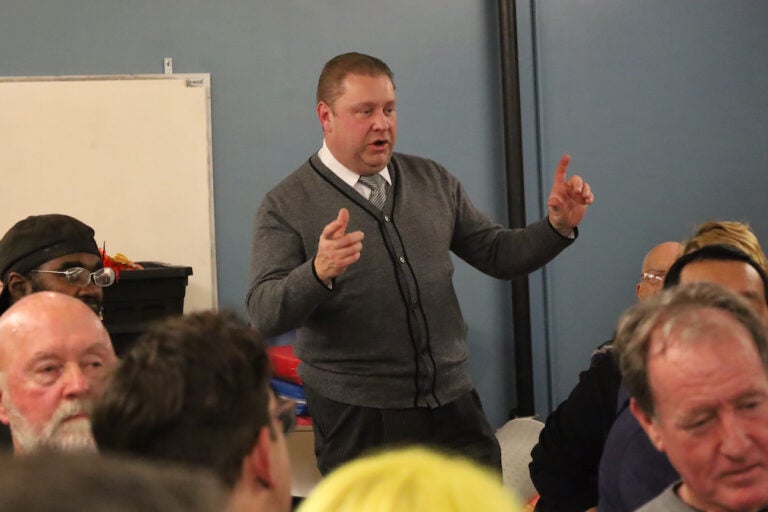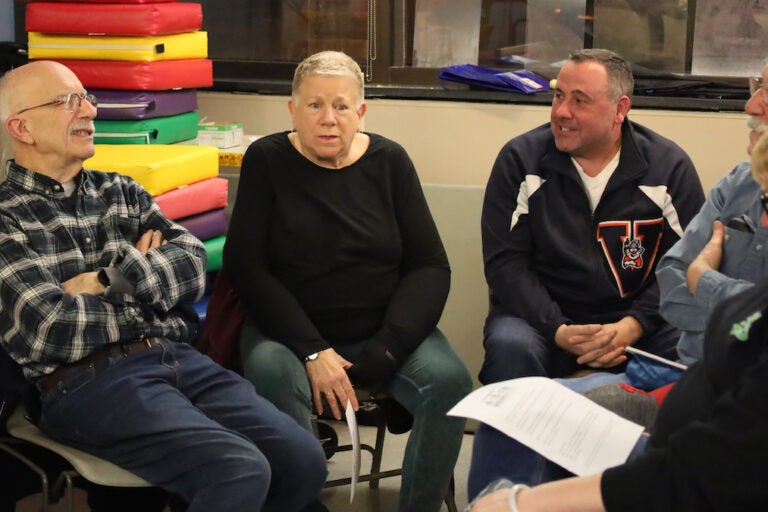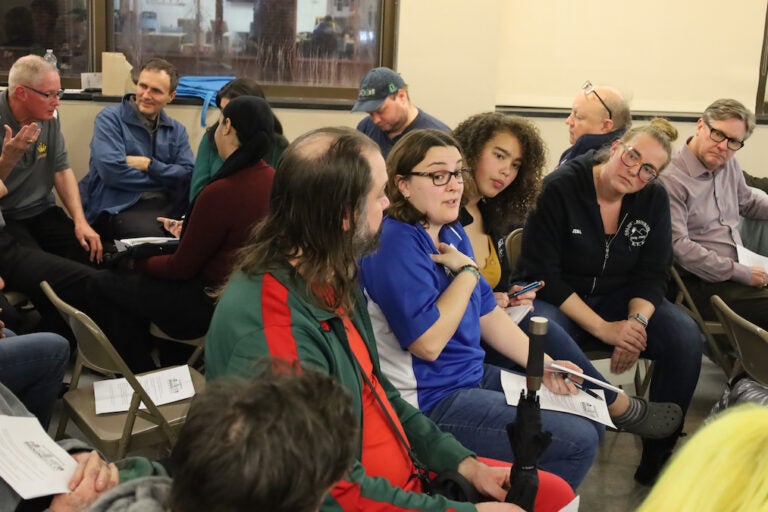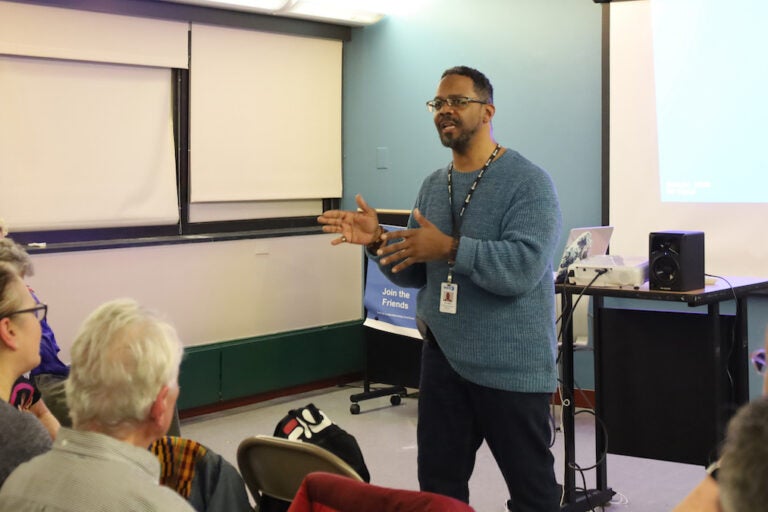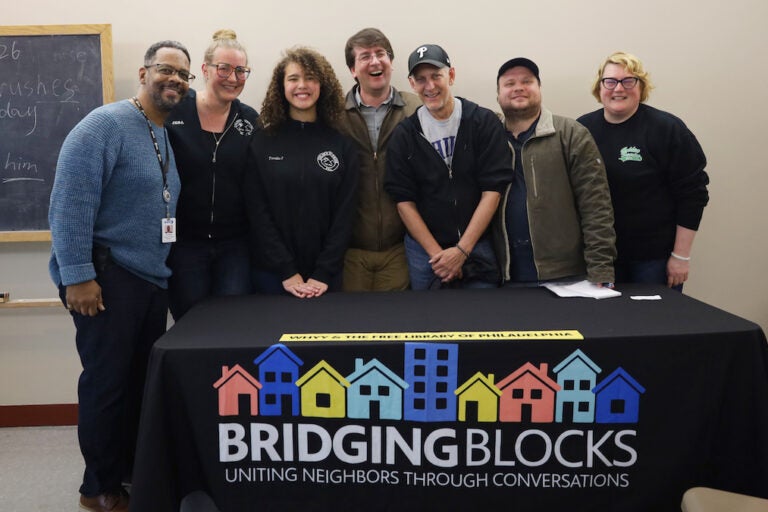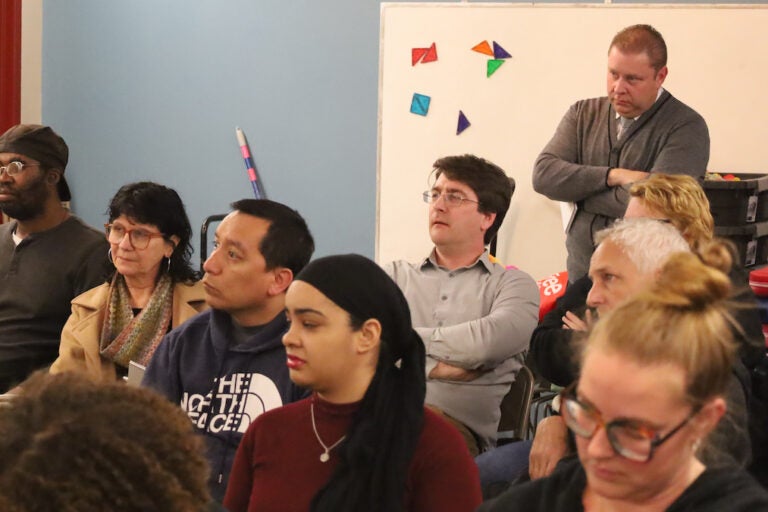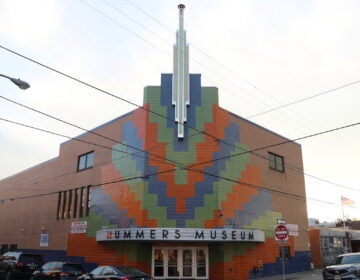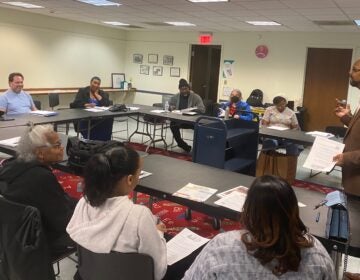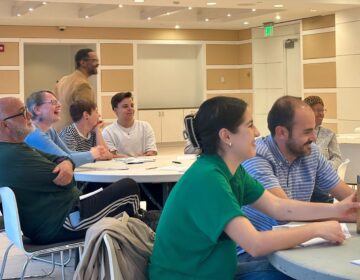Bridging Blocks event unearths the impact of Philly’s Mummers
The significance of Philadelphia’s Mummers tradition was the focal point of a WHYY News and Free Library of Philadelphia community discussion.
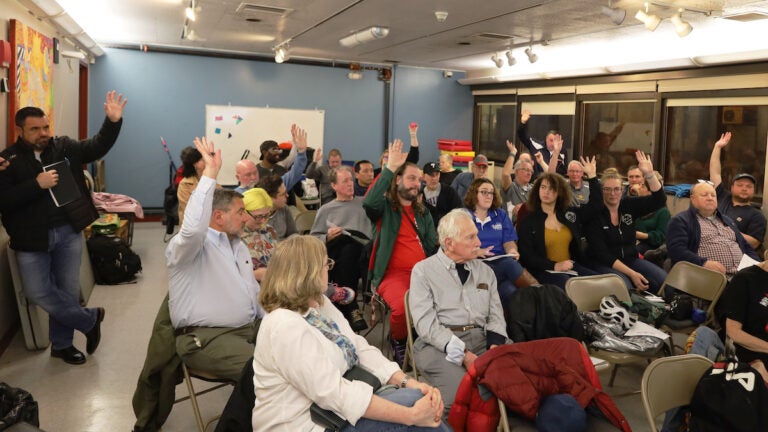
Community members talk together at a Bridging Blocks community discussion about the Mummers on Feb. 27, 2024. (Jochebed Airede/WHYY)
From Philly and the Pa. suburbs to South Jersey and Delaware, what would you like WHYY News to cover? Let us know!
The Bridging Blocks program brought together about four dozen community members to discuss the impact of the Mummers in Philadelphia for the second time in a few weeks. The gathering prompted an honest discussion of fact versus fiction and the impact of the Mummers’ 100-plus-year legacy.
Eric Marsh, Sr., WHYY News’ manager of community and engagement, moderated “Reimagining the Mummers: A Conversation on Tradition and Inclusion” at the Independence Library on Tuesday.
Bridging Blocks’ mission of encouraging civil dialogue at a time when civil discourse may be inflamed by divisive politics is promising and an opportunity for the Mummers to explore who they are and their values and traditions. This discussion went behind the most recent headlines from this year’s Mummers Parade.
“I get to be a Mummer all day, every day,” said Scott Brown, executive director of the Mummers Museum in South Philadelphia, who paid homage to the late Eleanor Stewart.
Brown shared that Philadelphia City Council approved a $500,000 grant to invest in the Mummers Museum, thus securing the funds needed for septic repairs and parking lot drainage systems. He said these were essential upgrades as the museum prepares to celebrate its 50th anniversary.
The funding supports increasing community engagement, commissioning a mural to celebrate diversity and programming with local jazz groups and theaters.
Before the community conversations began, a clip from “Strut!,” a 2001 documentary, was played, catapulting the attendees to experience the intense preparations for the Mummers’ New Year’s Day parade.
“It’s a year-long affair,” agreed Amita Creamer, a 13-year-old member of the Golden Sunrise Fancy Division. “[We put] our mind, body, and soul into [it].”
“‘Mummer’ [comes from] momus, Greek for ‘mimic,’ and the Roman Saturnalia [when] the roles were reversed: The working class could mimic the wealthy,” explained Jennifer Hensell, another member of the Golden Sunrise Fancy Division. (The Fancy Division is one of five divisions that partake in the parade’s yearly colorful display.)
Approximately 50 participants self-selected into three large groups to ponder five questions on their individual relationship with mummery, the challenges they think the community has faced, and their hopes for the future.
“How would you describe Mummery to folks who have no idea?” Marsh mused, inaugurating the conversation.
A few things surfaced from the conversations — everyone who is a Mummer is a proud one. And if they aren’t a Mummer, they are proud to know one.
“[They are] entertainers for one day a year, working 364 days a year,” said Murray Dubin, former reporter at The Philadelphia Inquirer and author of “Tasting Freedom: Octavius Catto and the Battle for Equality in Civil War America,” a look at the life and toils of civil rights leader Octavius Catto, and “South Philadelphia: Mummers, Memories and the Melrose Diner,” an investigation of life in South Philly. “That’s crazy! Folks in this city and city government don’t understand or agree with that.”
But their show isn’t limited to New Year’s Day alone. “We perform all year-round, like ‘Disney on Ice.’ There’s the big production [and] there are events throughout the year,” said Sam Regalbuto, president of the Philadelphia Mummers String Band Association.
Costumes are also handmade, stitched together by a unit of seamstresses.
Breast cancer survivor and former member of the Fancy Brigade parade Janice Wilson shared that her fellow paraders were a “support network” for breast cancer survivors. Wilson recalled sequins tumbling over her bed, much to her delight, and her nurse’s displeasure when she was visited by her friends from the Fancy Brigade.
Indeed, every Mummer seems to have their own role. Families are brought closer together, according to Jeff Traveline, a member of the South Philly Vikings. He remarked that his teenage sons typically have “two minutes a day” for him. But, when they prepare for a show, they are side-by-side for hours.
Dilmar Gamero, who emigrated from Peru to the United States in pursuit of his graduate studies, shared that, despite the naysayers, his experience with the Mummers has been positive.
“I was with the [Polish American String Band] for two years,” said Gamero. “I told them, ‘Thank you for letting me walk next to you.’ They said, ‘You don’t walk next to us; you are part of us.’ Here, the community is strong.”
However, Gamero lamented the lack of a relationship between the Mummers and the community around them. “Who knows about the Mummers? The Mummers. What about the others?”
Indeed, many in the room agreed that it is not exactly fair that the Mummers Parade is typically cast in a negative light by the media. “The first thing not to do is Google the Mummers,” noted Regalbuto. “Negativity sells. Those who become a part of [the Mummers] rarely ever leave it.”
Sounds of assent rippled through the room.
Why have the Mummers been unable to shake off their bad image?
“I wish people would believe us when we say everyone is welcome,” said Jesa Stiglich, a member of the Golden Sunrise Division’s board of directors.
“We’ve become more diverse,” said Creamer. “Lots of countries have ‘messy’ pasts. You can walk through a door and be suited up as a Mummer immediately.”
If the Mummers and the Mummers Museum are as devoted to inclusivity as the people in this room believe, why is there a disconnect between their reality and other Philadelphians, and some Philadelphians of color?
“Mummer clubs are individual organizations,” explained Dubin. “We ought to be careful about [saying] how many organizations are truly open-door.”
Indeed, multiple clubs represent multiple Mummers divisions in Philadelphia. When Marsh asked the museum’s board of directors and the division leaders the last time they polled the individual clubs, the answer was unclear.
Some members of the audience wished that the media would focus more on what they argue is the inherently inclusive nature of the Mummers Parade since its introduction to the United States by Swedish settlers and the Irish and Italian immigrants who came after them.
“Mummery is from so many different immigrant cultures that add something new each time,” said Hensell.
One point of concern surrounds the parade’s ties to minstrelry. The adoption of the minstrel song “Oh, Dem Golden Slippers” isn’t as properly understood as some Mummers wish. Although the song’s Black composer, James Bland, is honored by the Mummers Museum, some Philadelphians and some Black people are uncomfortable with the Mummers’ association with an art form they believe is designed to ridicule them.
The Mummers are also being asked to explain their practices around gender equity. In the movie clip from “Strut!,” no women were featured, and some clubs limit women participants.
Stiglich took this as a challenge. “I’m trying!” she laughed.
There appears to be a communal understanding of the fine line between honoring tradition and downright sexism when it comes to deciding who parades in the individual clubs. Bill Burke, Jr., who celebrated his 67th parade this January, affirmed that some bands remain male-only to keep the tradition of male-only clubs alive, not necessarily because they dislike women.
“My daughter was the first woman [in my club],” said Burke, Jr. “I said, ‘If she can’t parade, I’ll go somewhere else.’ To survive, [we] needed to add women.”
This exchange happened in 1977.
“The older promotional information doesn’t reflect its diversity now,” agreed Kate Sgouros, a transplant from Missouri.
Something must be said, nonetheless, about how Mummery does subvert traditional gender roles and expectations. Travelina aptly noted that his sons would not ordinarily partake in dance or choreography, but they do so for the sake of the Mummers Parade.
Persistent community engagement is the path the Mummers Museum is now taking: visiting schools, encouraging junior memberships and working with local personalities such as Jacky Bam Bam, a radio DJ and Mummer himself.
Brown fondly recalled an exchange with a student that shapes his current philosophy on reforming the Mummers’ image. On a school visit, the Mummers Museum had students make their own Mummer on a stick. Brown was approached by a student who, having participated in this activity before, remarked that Brown had “changed [his] life” because he said that students might have only made white Mummers, but now they might make a Mummer who was Black, just like him.
“If a third grader gets it,” said Brown, “then so can we.”
Editor’s Note: An earlier version of this story included an incorrect first name for James Bland, composer of “Oh, Dem Golden Slippers,” and mistakenly noted that the Mummers Museum had no female board members, which is not accurate. The story has been updated.

Get daily updates from WHYY News!
WHYY is your source for fact-based, in-depth journalism and information. As a nonprofit organization, we rely on financial support from readers like you. Please give today.


